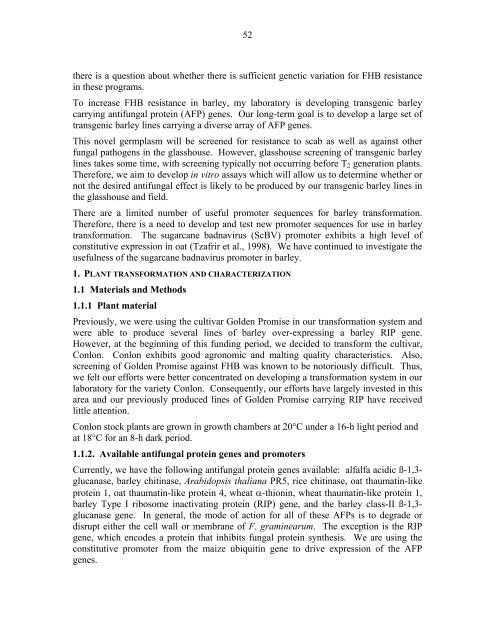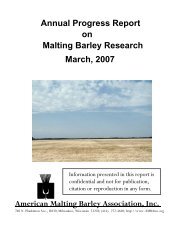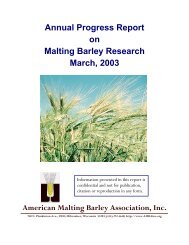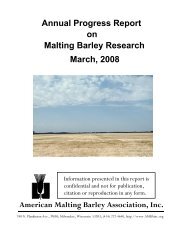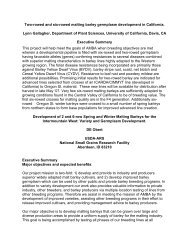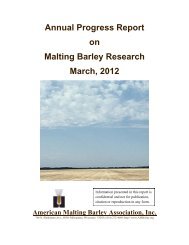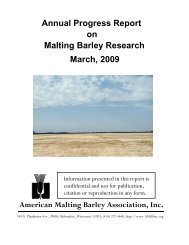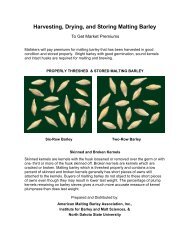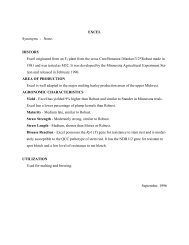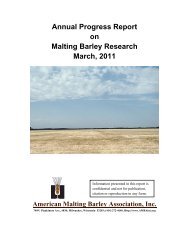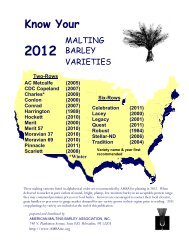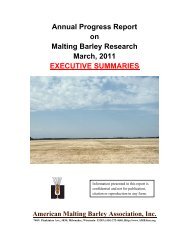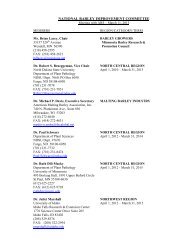Annual Progress Report on Malting Barley Research March, 2002
Annual Progress Report on Malting Barley Research March, 2002
Annual Progress Report on Malting Barley Research March, 2002
You also want an ePaper? Increase the reach of your titles
YUMPU automatically turns print PDFs into web optimized ePapers that Google loves.
52<br />
there is a questi<strong>on</strong> about whether there is sufficient genetic variati<strong>on</strong> for FHB resistance<br />
in these programs.<br />
To increase FHB resistance in barley, my laboratory is developing transgenic barley<br />
carrying antifungal protein (AFP) genes. Our l<strong>on</strong>g-term goal is to develop a large set of<br />
transgenic barley lines carrying a diverse array of AFP genes.<br />
This novel germplasm will be screened for resistance to scab as well as against other<br />
fungal pathogens in the glasshouse. However, glasshouse screening of transgenic barley<br />
lines takes some time, with screening typically not occurring before T2 generati<strong>on</strong> plants.<br />
Therefore, we aim to develop in vitro assays which will allow us to determine whether or<br />
not the desired antifungal effect is likely to be produced by our transgenic barley lines in<br />
the glasshouse and field.<br />
There are a limited number of useful promoter sequences for barley transformati<strong>on</strong>.<br />
Therefore, there is a need to develop and test new promoter sequences for use in barley<br />
transformati<strong>on</strong>. The sugarcane badnavirus (ScBV) promoter exhibits a high level of<br />
c<strong>on</strong>stitutive expressi<strong>on</strong> in oat (Tzafrir et al., 1998). We have c<strong>on</strong>tinued to investigate the<br />
usefulness of the sugarcane badnavirus promoter in barley.<br />
1. PLANT TRANSFORMATION AND CHARACTERIZATION<br />
1.1 Materials and Methods<br />
1.1.1 Plant material<br />
Previously, we were using the cultivar Golden Promise in our transformati<strong>on</strong> system and<br />
were able to produce several lines of barley over-expressing a barley RIP gene.<br />
However, at the beginning of this funding period, we decided to transform the cultivar,<br />
C<strong>on</strong>l<strong>on</strong>. C<strong>on</strong>l<strong>on</strong> exhibits good agr<strong>on</strong>omic and malting quality characteristics. Also,<br />
screening of Golden Promise against FHB was known to be notoriously difficult. Thus,<br />
we felt our efforts were better c<strong>on</strong>centrated <strong>on</strong> developing a transformati<strong>on</strong> system in our<br />
laboratory for the variety C<strong>on</strong>l<strong>on</strong>. C<strong>on</strong>sequently, our efforts have largely invested in this<br />
area and our previously produced lines of Golden Promise carrying RIP have received<br />
little attenti<strong>on</strong>.<br />
C<strong>on</strong>l<strong>on</strong> stock plants are grown in growth chambers at 20°C under a 16-h light period and<br />
at 18°C for an 8-h dark period.<br />
1.1.2. Available antifungal protein genes and promoters<br />
Currently, we have the following antifungal protein genes available: alfalfa acidic ß-1,3glucanase,<br />
barley chitinase, Arabidopsis thaliana PR5, rice chitinase, oat thaumatin-like<br />
protein 1, oat thaumatin-like protein 4, wheat α-thi<strong>on</strong>in, wheat thaumatin-like protein 1,<br />
barley Type I ribosome inactivating protein (RIP) gene, and the barley class-II ß-1,3glucanase<br />
gene. In general, the mode of acti<strong>on</strong> for all of these AFPs is to degrade or<br />
disrupt either the cell wall or membrane of F. graminearum. The excepti<strong>on</strong> is the RIP<br />
gene, which encodes a protein that inhibits fungal protein synthesis. We are using the<br />
c<strong>on</strong>stitutive promoter from the maize ubiquitin gene to drive expressi<strong>on</strong> of the AFP<br />
genes.


